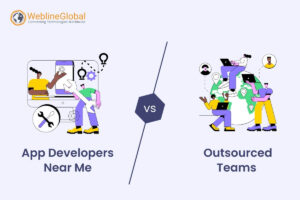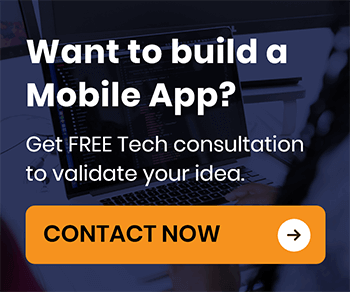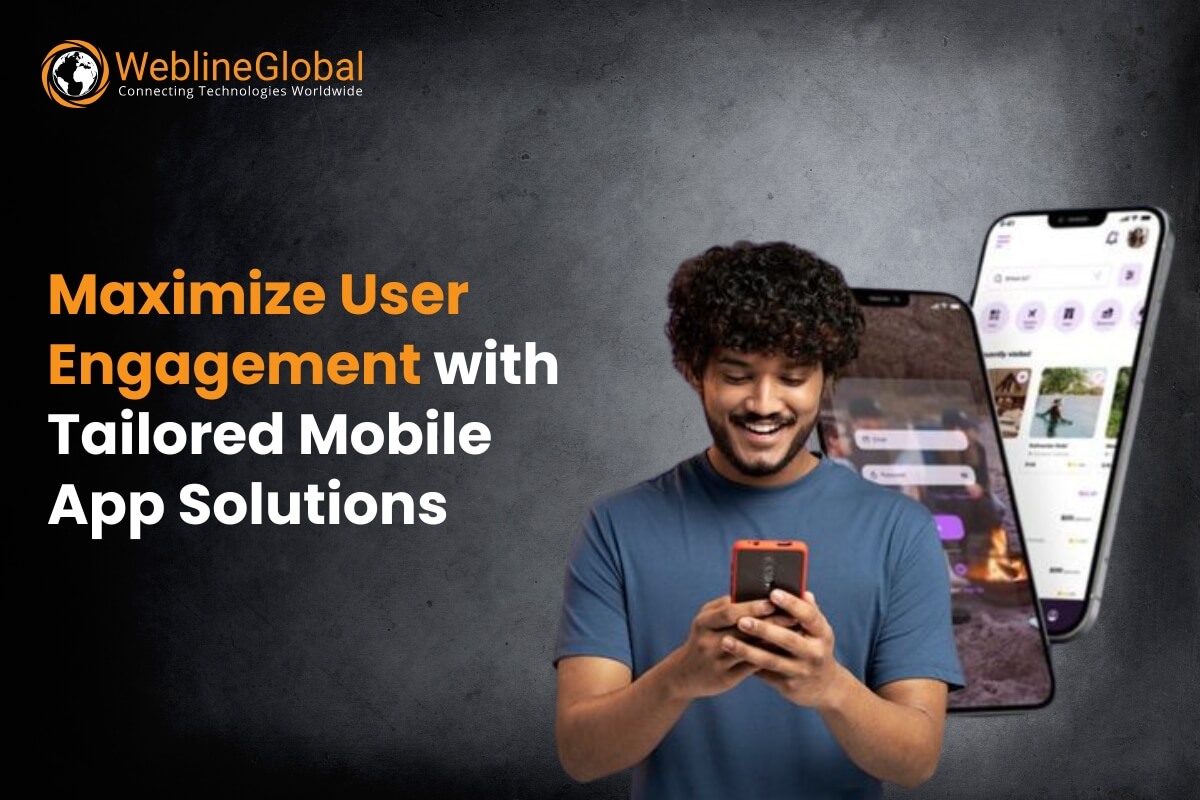
In today’s increasingly digital marketplace, customer engagement is crucial — and yet, many businesses still wonder why mobile apps fail to deliver results. Often, it comes down to a lack of personalization, poor user experience, or generic solutions. Custom app development addresses these issues directly. Tailored mobile applications offer personalized experiences that resonate with users, fostering loyalty and enhancing satisfaction.
Statista reports that the number of downloads is forecast to experience significant growth in all segments in 2027. The trend observed from 2019 to 2027 remains consistent throughout the entire forecast period. There is a continuous increase in the indicator across all segments.
Let us explore how mobile app development services can be leveraged to maximize customer engagement, delving into the benefits, strategies, and best practices for creating impactful mobile applications.
Ready to boost customer loyalty with a custom mobile app? Let’s build it together.
Understanding the Importance of Customer Engagement
Customer engagement refers to the emotional connection between a brand and its customers. It’s about creating meaningful interactions that encourage customers to return and advocate for the brand. In the context of mobile applications, engagement can be measured through metrics like app usage frequency, session length, and user retention rates.
The Role of Mobile Applications in Engagement
Mobile apps serve as direct channels between businesses and their customers. Unlike websites, apps offer a more personalized and interactive experience. Features such as push notifications, in-app messaging, and personalized content can drive user engagement by providing timely and relevant information.
The Power of Custom App Development
Custom app development involves creating applications tailored to the specific needs and preferences of a business and its customers. Unlike off-the-shelf solutions, custom apps are designed to align with a company’s unique objectives, branding, and user expectations.
Benefits of Custom App Development
- Personalization: Custom apps can be designed to offer personalized experiences, such as tailored content and recommendations, enhancing user satisfaction.
- Brand Identity: A bespoke app reflects the company’s brand identity, fostering a stronger connection with users.
- Scalability: Custom solutions can be scaled to accommodate business growth and evolving customer needs.
- Integration: Custom apps can seamlessly integrate with existing systems and processes, improving operational efficiency.
Key Features That Enhance Customer Engagement
To maximize customer engagement, mobile applications should incorporate features that facilitate interaction and provide value to users.
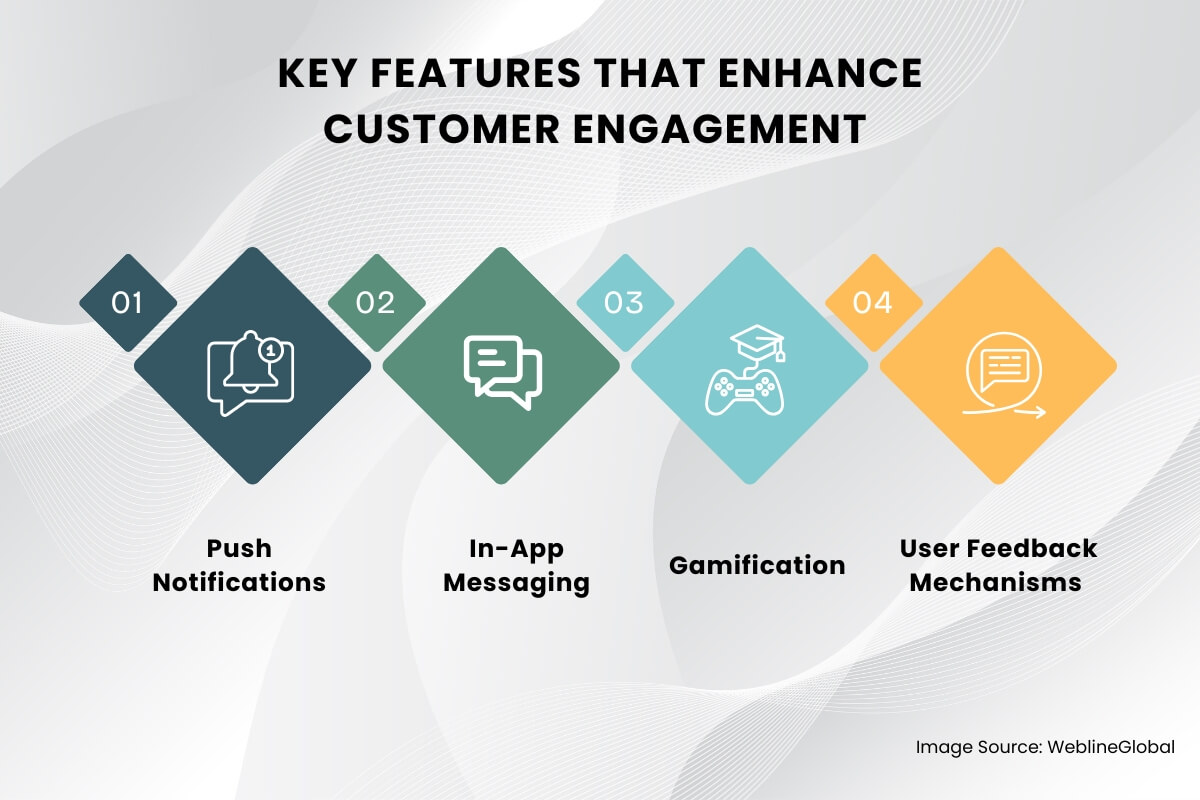
Push Notifications
Push notifications are a powerful tool for re-engaging users. They can be used to inform users about new content, promotions, or updates, encouraging them to open the app and interact with its features.
In-App Messaging
In-app messaging allows businesses to communicate directly with users while they are using the app. This feature can be used for customer support, feedback collection, or delivering personalized offers.
Gamification
Incorporating game-like elements, such as rewards, challenges, and leaderboards, can make the app experience more engaging and enjoyable, encouraging users to spend more time within the app.
User Feedback Mechanisms
Integrating features that allow users to provide feedback, such as surveys or rating systems, can help businesses understand user preferences and improve the app experience accordingly.
Looking to engage your users with powerful app features tailored to your business needs?
Strategies for Effective Mobile App Development
Creating a successful mobile application requires more than just coding an idea into existence. It demands a thoughtful approach that balances technical proficiency with a deep understanding of user behavior. These strategies serve as a blueprint for businesses looking to maximize customer engagement through expert mobile app development.
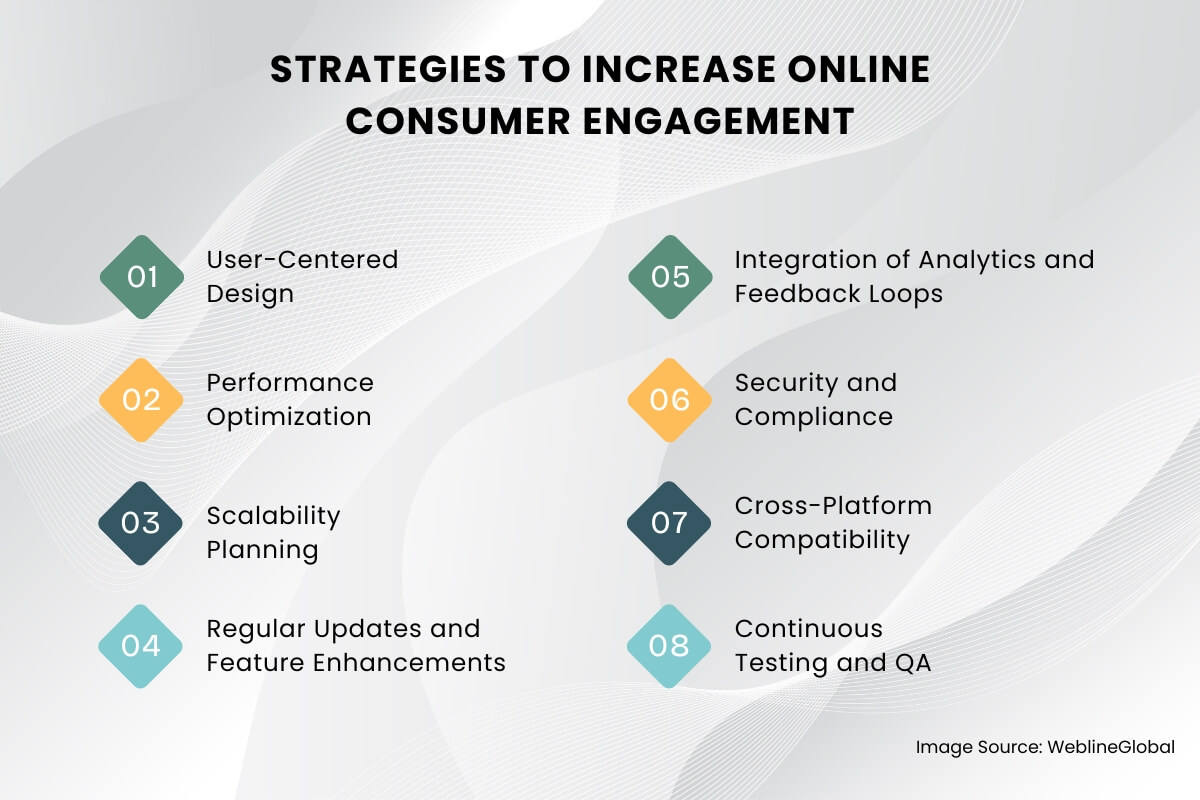
1. User-Centered Design
A well-designed app starts with the user in mind. Understanding what your target audience wants from a mobile experience is fundamental. User-centered design incorporates UX research techniques like user interviews, surveys, and behavior mapping to build an app structure that feels intuitive and useful.
Key elements include:
- Clear navigation and logical flow
- Minimalist interface with essential functionalities
- Accessibility considerations for users with diverse needs
- Adaptive design for different screen sizes and devices
Prioritizing usability ensures that the final product not only attracts users but keeps them coming back.
2. Performance Optimization
No matter how visually appealing an app is, poor performance can destroy engagement. Users expect apps to launch quickly and run smoothly without lags, glitches, or crashes. Mobile app development efforts must include comprehensive testing and optimization for speed, memory usage, and responsiveness.
Best practices involve:
- Using efficient data storage and caching strategies
- Reducing the app’s load on device resources
- Ensuring compatibility with multiple operating system versions
- Implementing robust error handling
A seamless user experience boosts satisfaction and decreases uninstall rates.
3. Scalability Planning
Planning for scale from the outset is a hallmark of professional custom app development. Applications that gain traction often experience growing demands—more users, more data, and more complex functionality. Scalable architecture allows apps to handle these increases without degrading performance or requiring a full rebuild.
Some scalable development strategies include:
- Cloud-based backend services
- Microservices architecture
- Modular coding for feature expansion
- APIs that support third-party integrations
Thinking ahead ensures your app remains competitive and viable long-term.
4. Regular Updates and Feature Enhancements
Apps are not one-time projects—they are ongoing products that require continuous evolution. Rolling out regular updates not only fixes bugs but shows users that the brand is actively improving and investing in their experience. These updates can include new features, UI enhancements, security patches, or performance improvements.
Maintaining a consistent update schedule helps:
- Encourage users to keep the app installed
- Gather feedback and adapt the product accordingly
- Stay ahead of competitors by offering modern functionality
Updates are also an opportunity to implement features based on real-time analytics and usage trends.
5. Integration of Analytics and Feedback Loops
Understanding how users interact with the app provides essential data for decision-making. Incorporating analytics tools allows businesses to monitor key metrics such as user retention, session length, screen flow, and drop-off points.
These insights help:
- Identify and eliminate usability bottlenecks
- Pinpoint features that drive the most engagement
- Measure the impact of marketing campaigns
- Refine future app updates
Feedback loops, such as in-app surveys or support chat, offer direct insight into user satisfaction, enabling developers to act swiftly on suggestions or complaints.
6. Security and Compliance
Trust is a crucial element of engagement. Users must feel confident that their data is secure and that the app adheres to privacy regulations. Especially for industries like finance, healthcare, and e-commerce, ensuring compliance with standards such as GDPR, HIPAA, or PCI-DSS is non-negotiable.
Essential security practices include:
- End-to-end encryption of sensitive data
- Secure authentication protocols (e.g., biometrics, 2FA)
- Regular penetration testing
- Compliance documentation and transparent privacy policies
Failing to prioritize security can lead to data breaches, legal issues, and irreparable brand damage.
7. Cross-Platform Compatibility
Not all users are on the same platform, so optimizing for both iOS and Android is critical. Using frameworks like Flutter or React Native, mobile app development services can efficiently build cross-platform apps without sacrificing performance or user experience.
Cross-platform support ensures:
- Wider market reach
- Faster development cycles
- Reduced maintenance costs
- Consistent UI/UX across devices
Choosing the right framework depends on the project’s complexity, desired features, and future scalability goals.
8. Continuous Testing and QA
Even minor bugs can frustrate users and impact engagement. Continuous testing throughout the development lifecycle ensures issues are caught early and resolved quickly. Employing a test-driven development (TDD) approach helps maintain high code quality and system reliability.
Effective QA includes:
- Unit testing
- UI/UX testing
- Automated regression testing
- Real-device testing
A robust QA process ensures that the final product meets expectations and delivers a flawless experience from the first launch.
Choosing the Right Mobile App Development Partner
Selecting the right partner for mobile app development services is crucial to the success of the project. A reputable development company can bring expertise, experience, and technical skills to the table, ensuring the creation of a high-quality app that meets business objectives.
Qualities to Look for in a Development Partner
- Experience: A partner with a proven track record in developing mobile applications across various industries.
- Technical Expertise: Proficiency in the latest technologies and development frameworks.
- Portfolio: A diverse portfolio showcasing successful app projects.
- Client Testimonials: Positive feedback from previous clients indicates reliability and quality of service.
WeblineGlobal: A Leading IT Agency in the US
When it comes to mobile app development services, WeblineGlobal stands out as a top IT agency in the US. With over 25 years of experience, we specialize in delivering custom app development solutions that drive customer engagement and business growth.
Why Choose WeblineGlobal?
- Expertise: WeblineGlobal boasts a team of skilled developers proficient in various technologies, ensuring the delivery of high-quality mobile applications.
- Customization: They offer tailored solutions that align with the unique needs and objectives of each client.
- Innovation: WeblineGlobal stays abreast of the latest industry trends, incorporating innovative features into your app development projects.
- Client Satisfaction: With a strong focus on client satisfaction, they work closely with clients to ensure the final product meets expectations.
For businesses seeking to enhance customer engagement through bespoke mobile applications, partnering with WeblineGlobal can provide the expertise and support needed to achieve success.
Partner with WeblineGlobal to build scalable mobile apps that drive real user engagement.
Ready to build customized business mobile apps in the USA?
In conclusion, maximizing customer engagement through bespoke mobile app development services is a strategic approach that can lead to increased user satisfaction, loyalty, and business success. Contact us now, and we can help you incorporate key features, adopt effective strategies while customizing mobile applications for your business that resonate with end users or customers and drive strategic growth to your company.
Social Hashtags
#MobileAppDevelopment #CustomAppDevelopment #AppDevelopmentServices #AppDevelopmentUSA #MobileApps #DigitalTransformation #BusinessGrowth #MobileAppSolutions #BusinessApps
